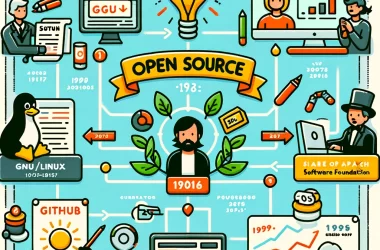The Resurgence of Cobol in Modern IT Infrastructure

Executive Summary

COBOL (COmmon Business-Oriented Language), known for its long-standing presence in the IT industry, has recently experienced a resurgence in popularity. Its ability to handle complex business logic, data manipulation, and legacy systems integration has made it a valuable asset in modern IT infrastructure. This resurgence is attributed to several factors, including the increasing demand for reliable and secure systems, the scarcity of skilled COBOL programmers, and the growing recognition of its adaptability in emerging technologies. This article delves into the reasons behind COBOL’s resurgence, highlighting its strengths and exploring its integration with modern technologies.

Introduction
In the rapidly evolving world of information technology, languages and technologies come and go. However, COBOL, a programming language designed in the 1950s, has stood the test of time and is experiencing a resurgence in popularity. Its endurance can be attributed to its stability, reliability, and ability to seamlessly integrate with modern technologies. This article examines the factors contributing to the resurgence of COBOL in modern IT infrastructure, showcasing its strengths and adaptability in various applications.
The Pillars of COBOL’s Resurgence
1. Enduring Legacy Systems:
• Stability and Reliability: COBOL programs have been in operation for decades, demonstrating exceptional stability and reliability. They have withstood the test of time and continue to function flawlessly, even in mission-critical applications.
• Legacy System Integration: COBOL’s ability to seamlessly integrate with legacy systems makes it a valuable asset in organizations with extensive existing infrastructure. It provides a bridge between the old and the new, ensuring continuity in operations and data access.
• Proven Performance: COBOL has a proven track record of performance, having supported mission-critical systems for decades. Its efficiency and reliability are crucial in applications where uptime and data integrity are paramount.
2. The Scarcity of Skilled COBOL Programmers:
• Aging Workforce: The majority of COBOL programmers are nearing retirement age, creating a shortage of skilled professionals with COBOL expertise.
• Limited Newcomers: The decline in computer science programs teaching COBOL has resulted in fewer new programmers entering the workforce with COBOL skills.
• High Demand for COBOL Programmers: The increasing demand for COBOL programmers, coupled with the dwindling supply, has led to a surge in their compensation and job opportunities.
3. Adaptability to Modern Technologies:
• Web Services and APIs: COBOL has evolved to support modern technologies such as web services and APIs, enabling seamless integration with other applications and systems.
• Cloud Computing: The ability to deploy COBOL applications on cloud platforms has extended its reach and scalability, catering to the dynamic needs of modern organizations.
• Mobile Applications: COBOL’s integration with mobile technologies has enabled the development of mobile applications that access and manipulate COBOL data, extending the reach of COBOL-based systems to mobile devices.
4. Cost-Effectiveness and Return on Investment:
• Lower Development Costs: COBOL’s simplicity and availability of open-source development tools make it cost-effective to develop and maintain COBOL applications.
• Reduced Risk of System Failure: The stability and reliability of COBOL programs minimize the risk of system failure, leading to reduced downtime and maintenance costs.
• Improved Operational Efficiency: COBOL’s ability to handle complex business logic and data manipulation tasks efficiently contributes to improved operational efficiency and productivity.
5. Growing Demand for Reliable and Secure Systems:
• Heightened Cybersecurity Concerns: The increasing frequency and sophistication of cyberattacks have heightened the demand for reliable and secure systems. COBOL’s robust design and proven track record in security make it an attractive option for organizations prioritizing data and system security.
• Compliance Requirements: Many industries have strict compliance requirements that mandate the use of reliable and secure systems. COBOL’s adherence to industry standards and regulations makes it a compliant choice for organizations in these industries.
Conclusion
In today’s dynamic technological landscape, the resurgence of COBOL is a testament to its enduring value and adaptability. Its strengths in stability, reliability, legacy system integration, cost-effectiveness, and adaptability to modern technologies make it a compelling choice for organizations looking to modernize their IT infrastructure without compromising on reliability and security. The availability of open-source development tools, coupled with the growing demand for COBOL programmers, ensures its continued relevance in the modern IT landscape.
Keyword Phrase Tags:
- COBOL resurgence
- Modern IT infrastructure
- Legacy system integration
- Scarcity of COBOL programmers
- Adaptability to modern technologies



I think that’s great news! COBOL is a very powerful language, and it’s good to see that it’s making a comeback. I’ve been working with COBOL for over 20 years, and I’ve seen how versatile it is. It’s a great language for business applications.
I’m not so sure about that. COBOL is a very old language, and it doesn’t seem like it’s very relevant anymore. There are a lot of newer, more modern languages that are better suited for today’s business needs.
Actually, COBOL is still very relevant today. It’s especially important for legacy systems, which are still very common in many businesses. COBOL is a very stable language, and it’s easy to maintain and update. This makes it a good choice for businesses that need to keep their legacy systems running smoothly.
I agree with Richard. COBOL is a very powerful language, and it’s still very relevant today. It’s especially important for businesses that have a lot of legacy systems. COBOL is a very stable language, and it’s easy to maintain and update. This makes it a good choice for businesses that need to keep their legacy systems running smoothly.
I think it’s funny that COBOL is making a comeback. It’s like a relic from the past. I can’t believe that businesses are still using it.
I agree with David. COBOL is a very outdated language. It’s not very efficient, and it’s not very easy to learn. I can’t believe that businesses are still using it.
I think it’s great that COBOL is making a comeback. It’s a very powerful language, and it’s still very relevant today. It’s especially important for businesses that have a lot of legacy systems. COBOL is a very stable language, and it’s easy to maintain and update. This makes it a good choice for businesses that need to keep their legacy systems running smoothly.
I’m not so sure about that. COBOL is a very old language, and it doesn’t seem like it’s very relevant anymore. There are a lot of newer, more modern languages that are better suited for today’s business needs.
Actually, COBOL is still very relevant today. It’s especially important for legacy systems, which are still very common in many businesses. COBOL is a very stable language, and it’s easy to maintain and update. This makes it a good choice for businesses that need to keep their legacy systems running smoothly.
I agree with Richard. COBOL is a very powerful language, and it’s still very relevant today. It’s especially important for businesses that have a lot of legacy systems. COBOL is a very stable language, and it’s easy to maintain and update. This makes it a good choice for businesses that need to keep their legacy systems running smoothly.
I think it’s funny that COBOL is making a comeback. It’s like a relic from the past. I can’t believe that businesses are still using it.
I agree with David. COBOL is a very outdated language. It’s not very efficient, and it’s not very easy to learn. I can’t believe that businesses are still using it.
I think it’s great that COBOL is making a comeback. It’s a very powerful language, and it’s still very relevant today. It’s especially important for businesses that have a lot of legacy systems. COBOL is a very stable language, and it’s easy to maintain and update. This makes it a good choice for businesses that need to keep their legacy systems running smoothly.